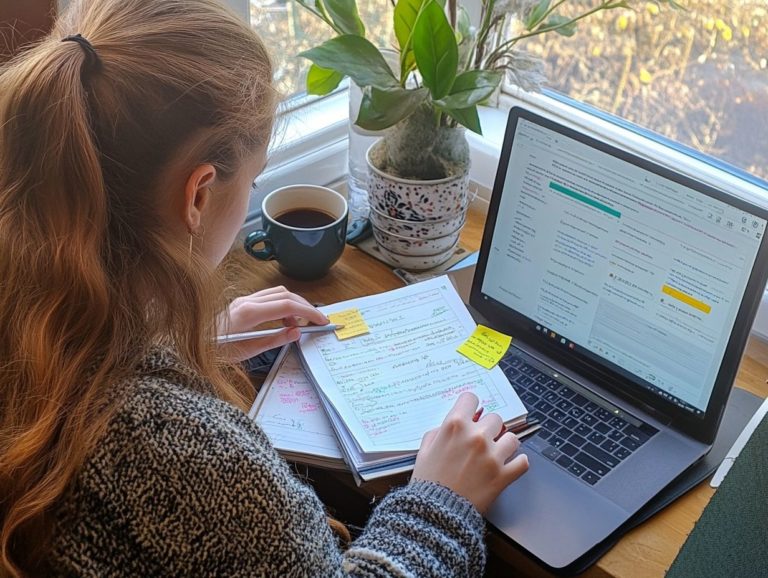the importance of answering easy questions first
In a world brimming with complex challenges, prioritizing easy questions can greatly enhance your learning experience. Tackling these straightforward queries first builds your confidence and creates a solid foundation for addressing more difficult material.
This article delves into the advantages of this approach, revealing how it can improve your retention and motivation. You ll discover practical tips for identifying easy questions and explore research that underscores their impact on test performance.
Embark on this journey to uncover strategies that can truly transform your learning experience!
Contents
- Key Takeaways:
- Understanding the Benefits of Answering Easy Questions First
- How Answering Easy Questions Can Improve Learning
- Tips for Answering Easy Questions Effectively
- Why Answering Easy Questions Matters
- Overcoming Challenges in Answering Easy Questions
- Frequently Asked Questions
- Why is it important to answer easy questions first?
- How can answering easy questions first improve test scores?
- In what situations is it particularly important to answer easy questions first?
- Can answering easy questions first help with time management?
- How can answering easy questions first help improve overall performance?
- Is it ever a good idea to skip easy questions and come back to them later?
Key Takeaways:

- Prioritizing easy questions boosts learning by enhancing confidence and motivation.
- Tackling straightforward questions positively impacts test performance, supported by research.
- Overcoming challenges like overthinking or rushing leads to more effective studying and test-taking.
Understanding the Benefits of Answering Easy Questions First
Addressing simpler questions first can greatly elevate a child’s exam preparation and overall learning journey. By prioritizing these easier questions, students can manage their time effectively and alleviate anxiety during exams.
This method aids in recalling concepts while building confidence, which is essential for academic success. Using strategies to tackle these questions establishes a positive feedback loop, fostering a sense of accomplishment that encourages further study.
Why It’s Important to Prioritize Easy Questions
Prioritizing easy questions during an exam is crucial for effective learning and managing stress, especially for children who may experience anxiety. Tackling simpler questions first builds momentum and confidence, significantly impacting overall performance.
This method aids in recalling essential concepts and helps you outline your answers for more complex sections. Focusing on straightforward queries reduces nervousness, allowing for a clearer approach to challenging problems.
In a high-pressure environment like an exam, managing anxiety is key to facilitating effective learning. Leveraging this technique can improve your academic performance and foster a healthier attitude toward testing, enabling you to face future assessments with confidence.
How Answering Easy Questions Can Improve Learning
Answering easy questions is an effective strategy for enhancing learning through active engagement with the material. When students focus on simpler questions, they reinforce their understanding of key concepts and develop vital skills in critical thinking and problem-solving.
This approach aids in information retention and fosters the confidence necessary to tackle more complex inquiries, ultimately enriching the overall learning experience for children.
Try these strategies in your next study session and watch your confidence soar!
Summary: Prioritizing easy questions enhances learning, builds confidence, and reduces anxiety. Implementing these strategies can transform your approach to studying and improve your performance in exams.
Retrieval Practice and Active Learning

Retrieval practice is a cornerstone of active learning, where you answer simple questions to reinforce concepts and boost your retention of information. This technique not only engages you but also gives you the power to cultivate critical skills essential for academic success, enabling you to make connections between various concepts more effectively.
By regularly recalling information, you can solidify your understanding and pinpoint areas that need more attention. This practice is especially beneficial when woven into your study routines, allowing you to tackle easier questions before moving on to more complex material. The confidence you gain from these early victories can inspire you to explore challenging topics more deeply.
Incorporating quizzes, flashcards, and peer discussions into your retrieval practice encourages active participation. This creates an educational atmosphere where knowledge can be applied readily and thoroughly. Ultimately, this method enhances your memory and fosters critical thinking, making it an invaluable strategy for effective learning.
Building Confidence and Motivation
Building your confidence and motivation is essential in the learning process. Tackling easier questions plays a crucial role in achieving these goals.
When you successfully answer simpler questions, that sense of accomplishment serves as fuel. It propels you to take on more challenging tasks and boosts your skill development.
This initial success not only boosts your self-esteem but also helps create a supportive learning environment. Imagine a classroom where students first engage with basic arithmetic problems before moving on to complex fractions. As you and your peers answer these easier questions correctly, your enthusiasm grows. This leads to more active participation in discussions and collaborative exercises.
This gradual buildup of competence encourages curiosity, motivating you to explore topics more deeply, ask questions, and ultimately become a lifelong learner.
Thus, confidence, motivation, and early victories create an exciting learning environment that benefits everyone involved.
Tips for Answering Easy Questions Effectively
Adopting effective strategies for tackling straightforward questions can greatly elevate your exam performance. By utilizing simple yet effective methods, you can swiftly identify and answer these easy questions, maximizing your time and showcasing your skills.
Mastering these approaches enhances your recall and comprehension of the material. It also promotes a more enriching learning experience overall.
Strategies for Identifying and Tackling Easy Questions
Identifying and addressing easier questions effectively demands strategic thinking and a solid grasp of the exam format. By pinpointing keywords or phrases that indicate these simpler questions, you can swiftly eliminate distractions and concentrate on showcasing your knowledge and skills in those areas.
To elevate your approach, consider employing methods like underlining or highlighting important terms in each question. This facilitates quicker identification and reinforces memory recall when the exam clock is ticking.
Incorporating efficient time management strategies, such as designating a specific time limit for each question, will prevent you from getting stuck on tough questions. This method builds momentum. It helps you maximize your scores by answering easier questions first, allowing for a confident start to the examination process.
Why Answering Easy Questions Matters

The impact of addressing easier questions on test performance is quite profound. It can significantly influence your confidence, anxiety levels, and overall approach to the exam.
By prioritizing simpler questions, you establish a solid foundation for success. This paves the way for more effective strategies when tackling the more challenging aspects of the test.
This positive trend not only manifests in your grades but also shapes your long-term learning habits.
Research and Studies on the Topic
Numerous research studies indicate that tackling easier questions can significantly enhance your academic performance and stress management. These studies underscore the value of strategic exam preparation. Prioritizing simpler questions contributes to improved learning outcomes and better concept recall.
For instance, a study published in the Journal of Educational Psychology found that students who began with easier questions experienced a notable drop in anxiety levels. This allowed them to approach more challenging problems with greater confidence.
Research from the University of California shows that breaking down complex material into manageable parts starting with simpler queries led to improved comprehension and retention.
These findings suggest that embracing a strategic approach not only deepens your understanding but also builds momentum. This encourages you to engage more fully with the material as you progress.
Overcoming Challenges in Answering Easy Questions
Overcoming challenges in answering seemingly simple questions is essential for effective exam preparation and overall performance.
Obstacles like anxiety or misidentification of question types can hinder your ability to tackle even the easier questions.
By implementing appropriate techniques and strategies, you can confront these challenges directly. This sets the stage for enhanced learning outcomes and greater academic success.
Common Obstacles and How to Overcome Them
Common obstacles in answering simple questions can include anxiety, misinterpretation, and lack of confidence. Recognizing these challenges is the first step toward overcoming them. This awareness allows you to develop effective strategies for a smoother exam experience.
As you navigate time constraints and the fear of making mistakes, anxiety can often creep in. Practicing mindfulness techniques or engaging in regular practice tests can significantly enhance your familiarity and confidence.
Breaking down questions into manageable parts improves comprehension and reduces misinterpretation. Seeking feedback from peers or teachers can further bolster your self-assurance.
By addressing these specific hurdles, you can enhance your performance and foster a more positive mindset toward your academic journey.
Frequently Asked Questions

-
Why is it important to answer easy questions first?
Answering easy questions first can help build confidence and momentum, making it easier to tackle more challenging questions later on.
-
How can answering easy questions first improve test scores?
By answering easy questions first, you ensure you have enough time to address all questions and minimize the risk of leaving any unanswered, which can negatively impact your overall score.
-
In what situations is it particularly important to answer easy questions first?
Answering easy questions first is a game-changer, especially in timed exams like standardized tests, where every question counts toward your final score.
-
Can answering easy questions first help with time management?
Yes! By tackling easy questions first, you can allocate more time for difficult ones and avoid spending too long on a single question, which can disrupt your test-taking pace.
-
How can answering easy questions first help improve overall performance?
Answering easy questions first builds a foundation of correct answers, boosting your confidence and potentially enhancing your overall performance on the exam.
-
Is it ever a good idea to skip easy questions and come back to them later?
Skipping easy questions to return later can be risky, as it may cause unnecessary stress and consume valuable time. It is generally recommended to answer easy questions first before moving on to more challenging ones.
Start applying these strategies in your next practice test and feel the difference!
With these strategies in your toolkit, you re ready to tackle any exam with confidence!





